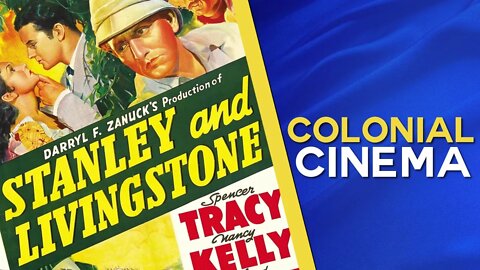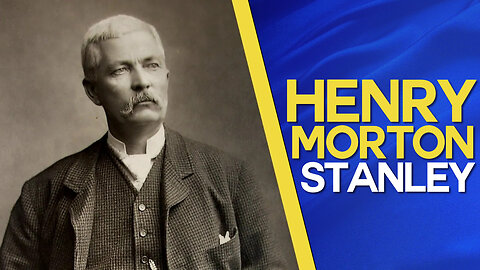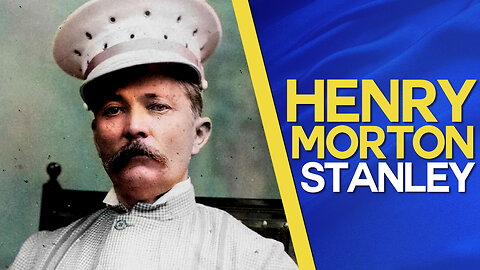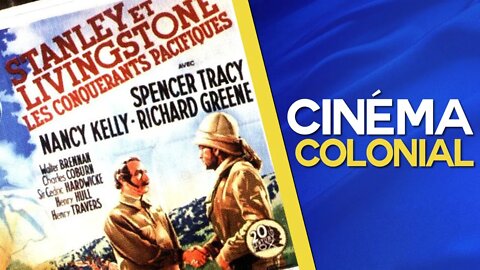
Henry Morton Stanley
7 videos
Updated 10 months ago
Sir Henry Morton Stanley GCB was a Welsh-American journalist, explorer, soldier, colonial administrator, author and politician who was famous for his exploration of central Africa
-
Stanley et Livingstone - Film de 1939 se déroulant en Afrique précoloniale (sous-titres Français)
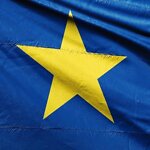 Belgian CongoDans les années 1860, le journaliste Henry M. Stanley (Spencer Tracy) est envoyé par son rédacteur en chef pour retrouver un missionnaire britannique disparu nommé Dr David Livingstone (Sir Cedric Hardwicke), qui est en expédition dans l'Afrique la plus sombre. La propre exploration de Stanley sur le continent révèle Livingstone, qui vit paisiblement parmi les indigènes, pratiquant la médecine. Lorsque Stanley revient à la civilisation avec la nouvelle que Livingstone est bel et bien vivant, mais n'apportant aucune preuve, il doit retourner en Afrique. Suivez sur Twitter : https://twitter.com/BasedCongo #HenryMoertonSytanley #DavidLivingstone #CinemaColonial46 views
Belgian CongoDans les années 1860, le journaliste Henry M. Stanley (Spencer Tracy) est envoyé par son rédacteur en chef pour retrouver un missionnaire britannique disparu nommé Dr David Livingstone (Sir Cedric Hardwicke), qui est en expédition dans l'Afrique la plus sombre. La propre exploration de Stanley sur le continent révèle Livingstone, qui vit paisiblement parmi les indigènes, pratiquant la médecine. Lorsque Stanley revient à la civilisation avec la nouvelle que Livingstone est bel et bien vivant, mais n'apportant aucune preuve, il doit retourner en Afrique. Suivez sur Twitter : https://twitter.com/BasedCongo #HenryMoertonSytanley #DavidLivingstone #CinemaColonial46 views -
The Story of Sir. Henry Morton Stanley
 Belgian CongoSir Henry Morton Stanley is considered one of the greatest explorers of the 19th Century. He was born with the name John Rowlands on January 28, 1841 in Denbigh, Wales. An illegitimate son, Rowlands spent his childhood in an orphanage. He eventually escaped the institution at age 15. In 1858, he became a cabin boy on a vessel headed for New Orleans. In America, he met a wealthy trader named Henry Hope Stanley, who treated him like a son. The young man took on his surrogate father’s name as a sign of gratitude when the businessman died in 1861. Stanley participated in the American Civil War as a member of the US Navy. Going on to work as a journalist, he reported on the aftermath of the California gold rush and the westward expansion of the US. Stanley later traveled throughout Turkey and Asia Minor, writing for several magazines. In 1867, the New York Herald hired him to be their special correspondent in Ethiopia. His career reached a turning point in 1871, when the New York Herald sent him to find Scottish explorer David Livingstone. Livingstone had disappeared during an expedition to find the source of the Nile. Stanley found him in Ujiji, a village on the shores of Lake Tanganyika, greeting him with the famous phrase, “Dr. Livingstone, I presume.” Instead of merely interviewing the man as he had originally planned, Stanley remained with Livingstone and helped explore Lake Tanganyika. In 1872, Stanley returned to Europe a hero. He recounted his feat in the best-selling book, How I Found Livingstone. In light of Stanley’s success, the New York Herald and the Daily Telegraph decided to finance him for another expedition. He left for Zanzibar on November 12, 1874 to continue Livingstone’s work. Stanley found that the Kagera River was the Nile’s ultimate, if indirect, source. The Kagera flows into Lake Victoria, which in turn gives rise to the Nile. Afterwards, Stanley headed south, becoming the first European to reach the Atlantic Ocean via the River Congo. In 1879, he returned to the Congo region on an expedition financed by King Leopold II of Belgium. During the journey, Stanley founded the city of Leopoldville and established trade with local chiefs. He thus laid the groundwork for the future colony known as the Belgian Congo. Stanley made his last trip to Africa in 1887. When chaos erupted in southern Sudan, he led an expedition to rescue the deposed governor, Emin Pasa. He then proceeded southward and discovered the Ruwenzori mountain chain as well as Lake Edward. Stanley returned to England in 1890 and married Welsh artist Dorothy Tennant. He served in the Parliament from 1895 to 1900 and was knighted. Sir Henry Morton Stanley died in London on May 10, 1904. He was 63. He succeeded where Livingstone and other explorers had failed, revealing the mystery of the Nile’s source. More info: http://www.ovovideo.com/en/henry-morton-stanley/ Follow on Twitter: https://twitter.com/BasedCongo #CongoFreeState #Congo #HenryMortonStanley138 views
Belgian CongoSir Henry Morton Stanley is considered one of the greatest explorers of the 19th Century. He was born with the name John Rowlands on January 28, 1841 in Denbigh, Wales. An illegitimate son, Rowlands spent his childhood in an orphanage. He eventually escaped the institution at age 15. In 1858, he became a cabin boy on a vessel headed for New Orleans. In America, he met a wealthy trader named Henry Hope Stanley, who treated him like a son. The young man took on his surrogate father’s name as a sign of gratitude when the businessman died in 1861. Stanley participated in the American Civil War as a member of the US Navy. Going on to work as a journalist, he reported on the aftermath of the California gold rush and the westward expansion of the US. Stanley later traveled throughout Turkey and Asia Minor, writing for several magazines. In 1867, the New York Herald hired him to be their special correspondent in Ethiopia. His career reached a turning point in 1871, when the New York Herald sent him to find Scottish explorer David Livingstone. Livingstone had disappeared during an expedition to find the source of the Nile. Stanley found him in Ujiji, a village on the shores of Lake Tanganyika, greeting him with the famous phrase, “Dr. Livingstone, I presume.” Instead of merely interviewing the man as he had originally planned, Stanley remained with Livingstone and helped explore Lake Tanganyika. In 1872, Stanley returned to Europe a hero. He recounted his feat in the best-selling book, How I Found Livingstone. In light of Stanley’s success, the New York Herald and the Daily Telegraph decided to finance him for another expedition. He left for Zanzibar on November 12, 1874 to continue Livingstone’s work. Stanley found that the Kagera River was the Nile’s ultimate, if indirect, source. The Kagera flows into Lake Victoria, which in turn gives rise to the Nile. Afterwards, Stanley headed south, becoming the first European to reach the Atlantic Ocean via the River Congo. In 1879, he returned to the Congo region on an expedition financed by King Leopold II of Belgium. During the journey, Stanley founded the city of Leopoldville and established trade with local chiefs. He thus laid the groundwork for the future colony known as the Belgian Congo. Stanley made his last trip to Africa in 1887. When chaos erupted in southern Sudan, he led an expedition to rescue the deposed governor, Emin Pasa. He then proceeded southward and discovered the Ruwenzori mountain chain as well as Lake Edward. Stanley returned to England in 1890 and married Welsh artist Dorothy Tennant. He served in the Parliament from 1895 to 1900 and was knighted. Sir Henry Morton Stanley died in London on May 10, 1904. He was 63. He succeeded where Livingstone and other explorers had failed, revealing the mystery of the Nile’s source. More info: http://www.ovovideo.com/en/henry-morton-stanley/ Follow on Twitter: https://twitter.com/BasedCongo #CongoFreeState #Congo #HenryMortonStanley138 views -
Stanley and Livingstone (1939 Adventure film Set in Pre-Colonial East and Central Africa)
 Belgian CongoIn the 1860s, journalist Henry M. Stanley (Spencer Tracy) is sent by his editor to track down a missing British missionary named Dr. David Livingstone (Sir Cedric Hardwicke), who is on an expedition in darkest Africa. Stanley's own exploration into the continent turns up Livingstone, who is living peacefully among the natives, practicing medicine. When Stanley returns to civilization with the news that Livingstone is alive and well, but bringing no proof, he has to journey back to Africa. Follow on Twitter: https://twitter.com/BasedCongo #HenryMoertonSytanley #DavidLivingstone #ColonialCinema58 views
Belgian CongoIn the 1860s, journalist Henry M. Stanley (Spencer Tracy) is sent by his editor to track down a missing British missionary named Dr. David Livingstone (Sir Cedric Hardwicke), who is on an expedition in darkest Africa. Stanley's own exploration into the continent turns up Livingstone, who is living peacefully among the natives, practicing medicine. When Stanley returns to civilization with the news that Livingstone is alive and well, but bringing no proof, he has to journey back to Africa. Follow on Twitter: https://twitter.com/BasedCongo #HenryMoertonSytanley #DavidLivingstone #ColonialCinema58 views -
The Great 1975 Congo River Expedition - In the footsteps of Henry Morton Stanley
 Belgian CongoIn 1874, the New York Herald and the Daily Telegraph financed Stanley on another expedition to Africa. His ambitious objective was to complete the exploration and mapping of the Central African Great Lakes and rivers, in the process circumnavigating Lakes Victoria and Tanganyika and locating the source of the Nile. Between 1875 and 1876 Stanley succeeded in the first part of his objective, establishing that Lake Victoria had only a single outlet – the one discovered by John Hanning Speke on 21 July 1862 and named Ripon Falls. If this was not the Nile's source, then the separate massive northward flowing river called by Livingstone, the Lualaba, and mapped by him in its upper reaches, might flow on north to connect with the Nile via Lake Albert and thus be the primary source. It was therefore essential that Stanley should trace the course of the Lualaba downstream (northward) from Nyangwe, the point where Livingstone had left it in July 1871. Between November 1876 and August 1877, Stanley and his men navigated the Lualaba up to and beyond the point where it turned sharply westward, away from the Nile, identifying itself as the Congo River. Having succeeded with this second objective, they then traced the river to the sea. During this expedition, Stanley used sectional boats and dug-out canoes to pass the large cataracts that separated the Congo into distinct tracts. These boats were transported around the rapids before being rebuilt to travel on the next section of river. In passing the rapids many of his men were drowned, including his last white colleague, Frank Pocock. Stanley and his men reached the Portuguese outpost of Boma, around 100 kilometres (62 mi) from the mouth of the Congo River on the Atlantic Ocean, after 999 days on 9 August 1877. Muster lists and Stanley's diary (12 November 1874) show that he started with 228 people and reached Boma with 114 survivors, with he being the only European left alive out of four. Follow on Twitter: https://twitter.com/BasedCongo #HenryMortonStanley #CongoRiver #Congo22 views
Belgian CongoIn 1874, the New York Herald and the Daily Telegraph financed Stanley on another expedition to Africa. His ambitious objective was to complete the exploration and mapping of the Central African Great Lakes and rivers, in the process circumnavigating Lakes Victoria and Tanganyika and locating the source of the Nile. Between 1875 and 1876 Stanley succeeded in the first part of his objective, establishing that Lake Victoria had only a single outlet – the one discovered by John Hanning Speke on 21 July 1862 and named Ripon Falls. If this was not the Nile's source, then the separate massive northward flowing river called by Livingstone, the Lualaba, and mapped by him in its upper reaches, might flow on north to connect with the Nile via Lake Albert and thus be the primary source. It was therefore essential that Stanley should trace the course of the Lualaba downstream (northward) from Nyangwe, the point where Livingstone had left it in July 1871. Between November 1876 and August 1877, Stanley and his men navigated the Lualaba up to and beyond the point where it turned sharply westward, away from the Nile, identifying itself as the Congo River. Having succeeded with this second objective, they then traced the river to the sea. During this expedition, Stanley used sectional boats and dug-out canoes to pass the large cataracts that separated the Congo into distinct tracts. These boats were transported around the rapids before being rebuilt to travel on the next section of river. In passing the rapids many of his men were drowned, including his last white colleague, Frank Pocock. Stanley and his men reached the Portuguese outpost of Boma, around 100 kilometres (62 mi) from the mouth of the Congo River on the Atlantic Ocean, after 999 days on 9 August 1877. Muster lists and Stanley's diary (12 November 1874) show that he started with 228 people and reached Boma with 114 survivors, with he being the only European left alive out of four. Follow on Twitter: https://twitter.com/BasedCongo #HenryMortonStanley #CongoRiver #Congo22 views -
Henry Morton Stanley: Explorer of the Very First Rank (1975)
 Belgian CongoStanley’s expedition covered 700 miles in 236 days, locating the ailing David Livingstone on November 10, 1871, on Ujiji Island near Lake Tanganyika. They explored together, but Livingstone, who had traveled extensively since 1840, was in declining health and died in 1873. Stanley served as a pallbearer at his Westminster Abbey funeral. In 1874, Stanley began his second expedition, researching the Congo and Nile rivers. He circumnavigated Victoria Nyanza and reached the Atlantic Ocean on August 12, 1877, but tragically lost three companions and the expedition’s dogs during the journey. #HenryMortonStanley #CongoRiver #Congo119 views
Belgian CongoStanley’s expedition covered 700 miles in 236 days, locating the ailing David Livingstone on November 10, 1871, on Ujiji Island near Lake Tanganyika. They explored together, but Livingstone, who had traveled extensively since 1840, was in declining health and died in 1873. Stanley served as a pallbearer at his Westminster Abbey funeral. In 1874, Stanley began his second expedition, researching the Congo and Nile rivers. He circumnavigated Victoria Nyanza and reached the Atlantic Ocean on August 12, 1877, but tragically lost three companions and the expedition’s dogs during the journey. #HenryMortonStanley #CongoRiver #Congo119 views -
Congo restores the statue of of "Henry Morton Stanley" after Mobutu demolished it 45 years ago
 Belgian CongoIn 2016 the statue of "Henry Morton Stanley" was restored at the National Museum of Kinshasa, after it was demolished 45 years ago by President Mobutu Sese Seko. Follow on Twitter: https://twitter.com/BasedCongo #BelgianCongo #HenryMortonStanley #MobutuSeseSeko6 views
Belgian CongoIn 2016 the statue of "Henry Morton Stanley" was restored at the National Museum of Kinshasa, after it was demolished 45 years ago by President Mobutu Sese Seko. Follow on Twitter: https://twitter.com/BasedCongo #BelgianCongo #HenryMortonStanley #MobutuSeseSeko6 views -
The Epic Journey of Henry Morton Stanley (2018)
 Belgian CongoStanley conducted several expeditions, notably mapping the Congo River's course from 1874 to 1877. His work opened up Central Africa for European involvement, and he later collaborated with King Leopold II of Belgium to help establish the Independent state of the Congo. Stanley's explorations made a lasting impact on the field of geography and are remembered as some of the most ambitious and challenging of his era. #HenryMortonStanley #CongoRiver #Congo10 views
Belgian CongoStanley conducted several expeditions, notably mapping the Congo River's course from 1874 to 1877. His work opened up Central Africa for European involvement, and he later collaborated with King Leopold II of Belgium to help establish the Independent state of the Congo. Stanley's explorations made a lasting impact on the field of geography and are remembered as some of the most ambitious and challenging of his era. #HenryMortonStanley #CongoRiver #Congo10 views

